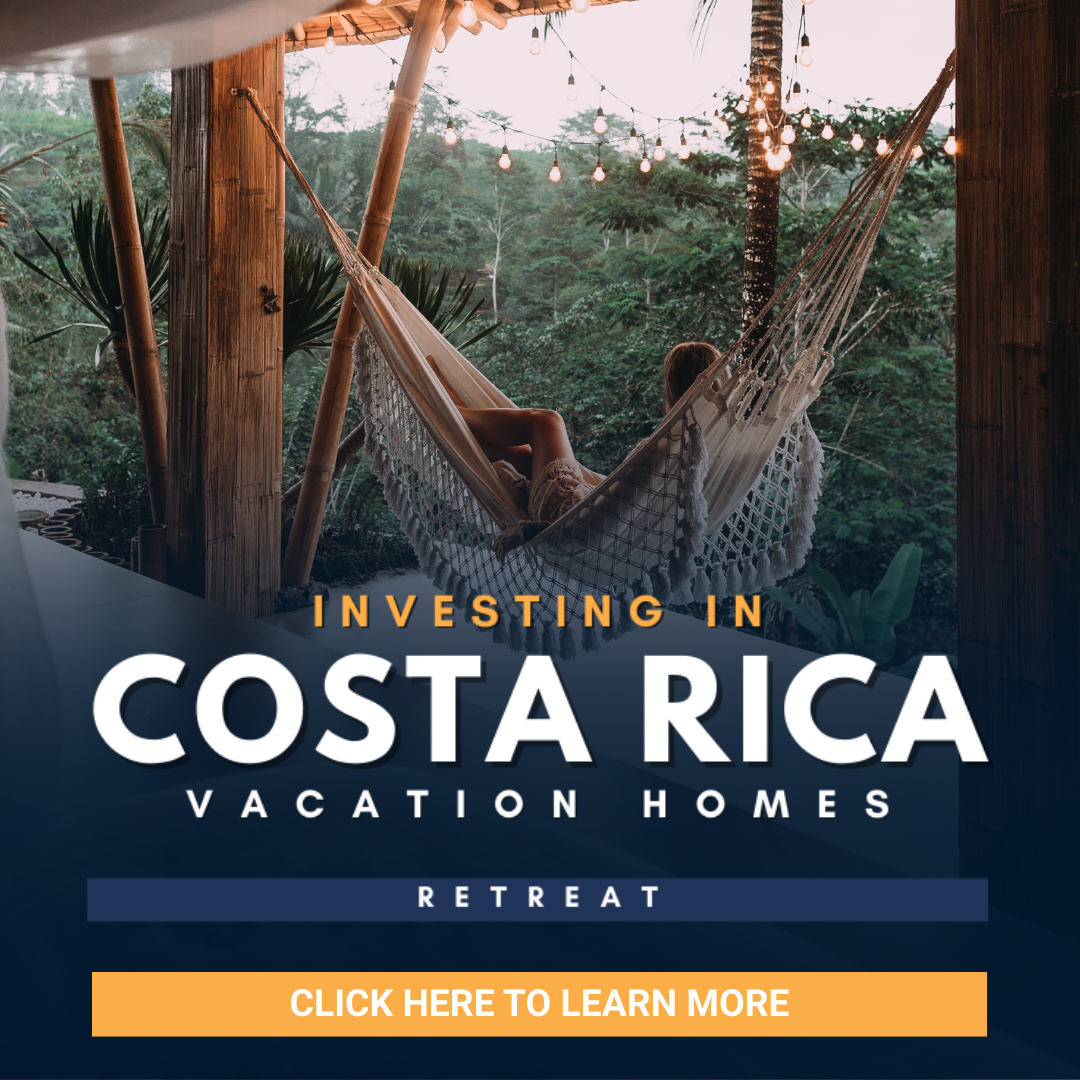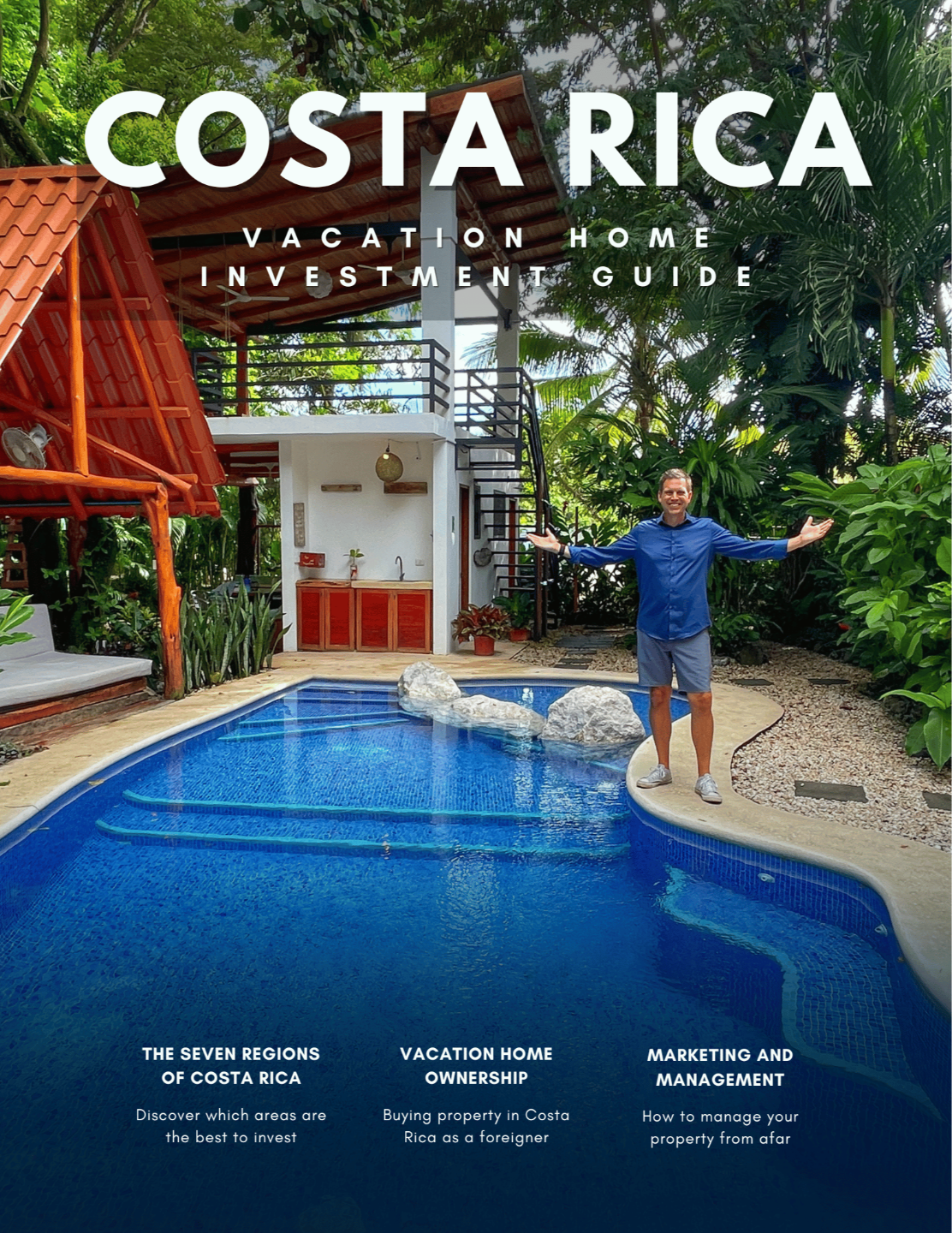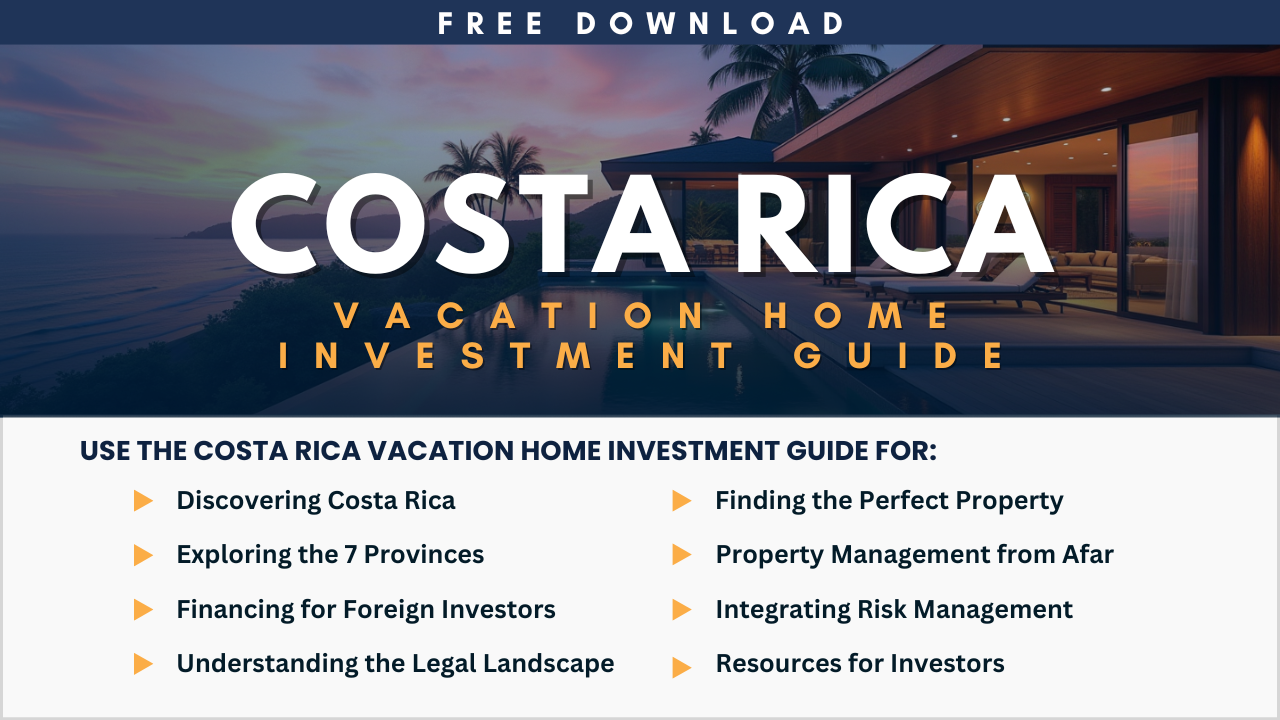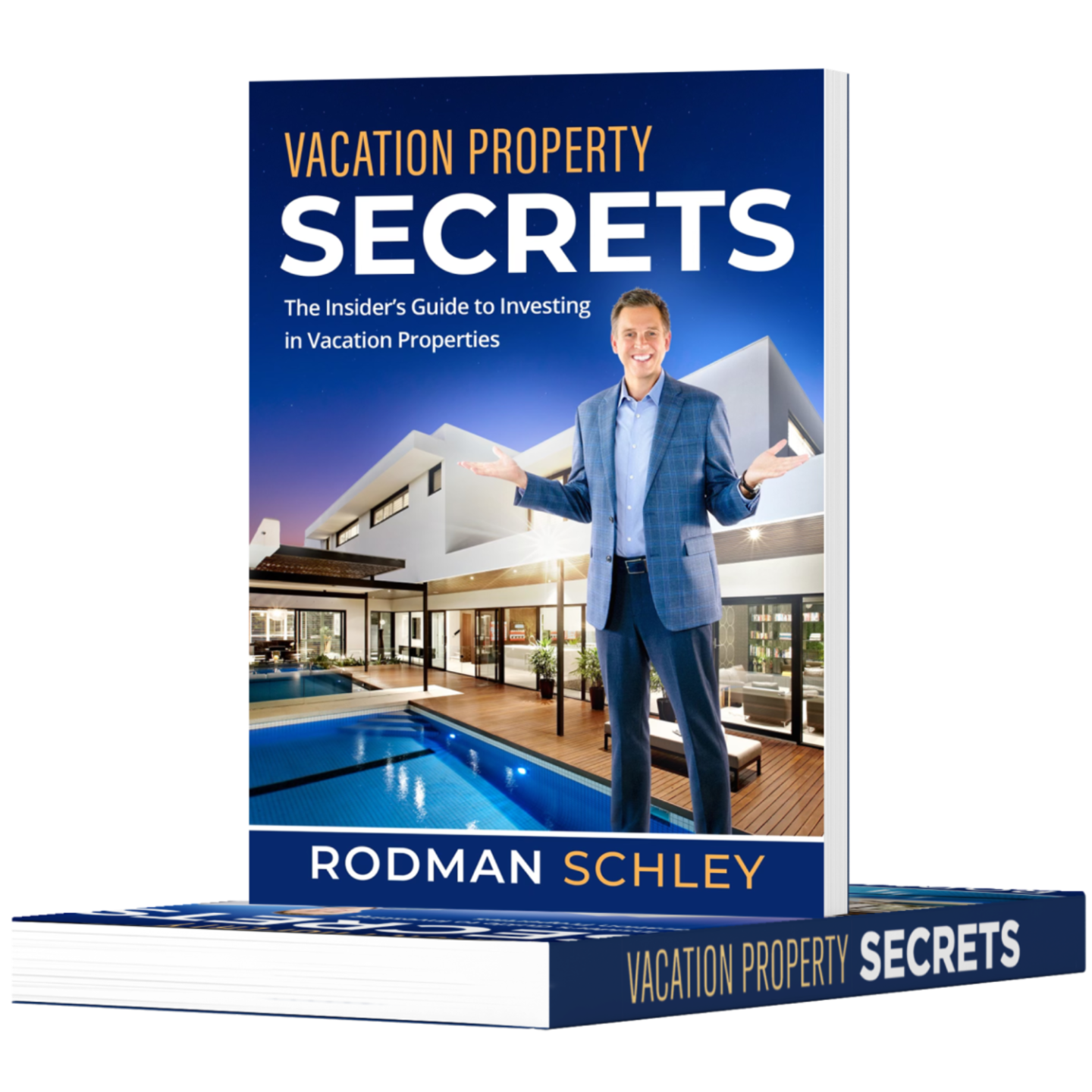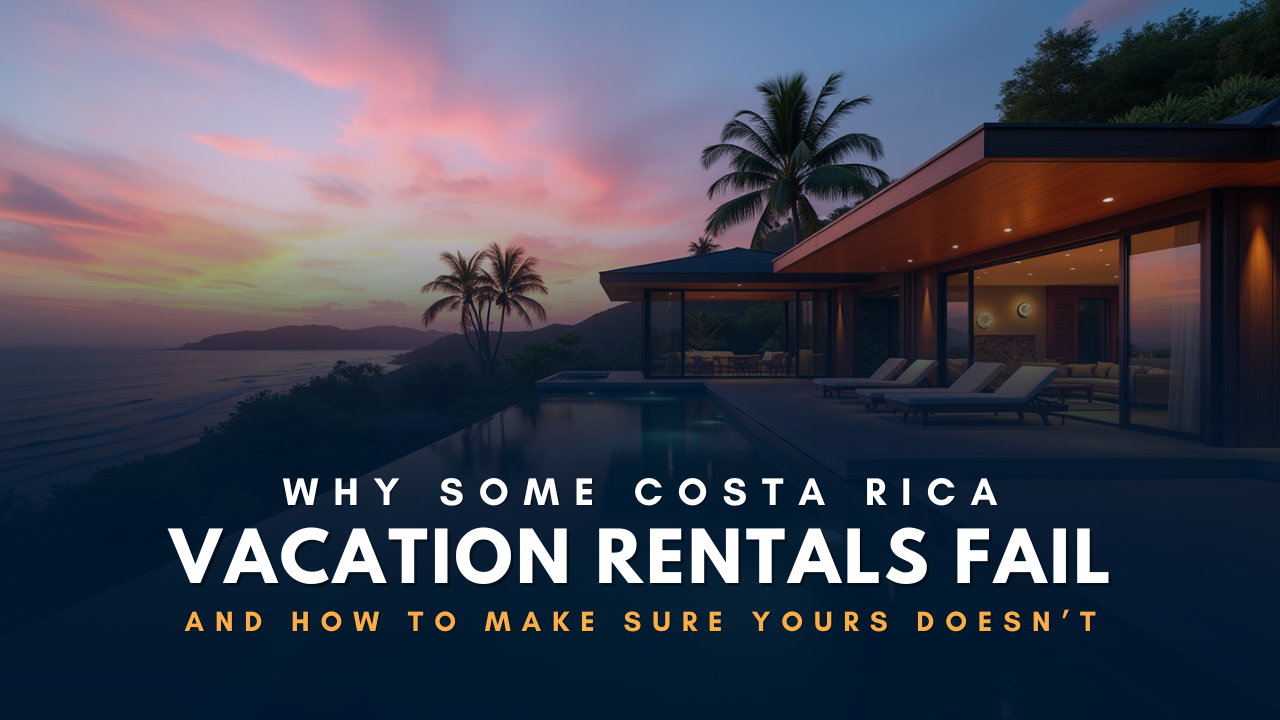
Why Some Costa Rica Vacation Rentals Fail (And How to Make Sure Yours Doesn’t)
It started with a dream—just like it does for most of us.
A friend of mine, let’s call him Jeff, had fallen in love with Costa Rica on a surf trip. One week of sunrise beach walks, fresh ceviche, and lazy hammock naps was all it took. By the time his return flight took off from Liberia International Airport, he was already checking real estate listings and imagining the perfect jungle escape.
Six months later, he owned a two-bedroom villa tucked in the hills outside a trendy Pacific Coast town.
The dream? Turn it into a profitable short-term rental that would cover its costs, maybe even generate some passive income, and give him a place to escape the Colorado winters.
The reality?
Twelve months in, the place was barely breaking even. Occupancy was low. His reviews were mixed. And managing the home from a different time zone was draining more energy than it was giving.
So what went wrong?
The truth is: Jeff made the same mistakes many first-time foreign investors make when they buy vacation homes in Costa Rica. And the good news? Every one of them is avoidable.
This post is about understanding why some Costa Rica vacation rentals fail—and more importantly, how to make sure yours doesn’t.
Mistake #1: Falling in Love with the Wrong Location
Jeff bought in a spot that was beautiful, but not particularly accessible. On paper, it looked like paradise—a hillside lot with sweeping jungle views and a sliver of ocean in the distance. The listing photos were stunning. It felt like a secret escape tucked away from the crowds.
But once he closed on the property and started preparing it for vacation rentals, the reality set in.
The roads were rough—unpaved, steep, and nearly impassable during the rainy season. The power went out frequently, especially when it rained. Water pressure was unreliable. Groceries and basic services required a 45-minute drive. And while the property had plenty of Instagram-worthy views, it lacked the one thing most travelers actually want: convenience.
It wasn’t walkable. There were no restaurants nearby. No beach access. No yoga studios or markets or cafes to wander to on a lazy morning. And most importantly—it lacked the kind of consistent traveler demand that makes a vacation rental successful.
The few guests who did book left polite but honest reviews. The views were amazing, they said—but it felt too isolated. One family even left early after struggling with the bumpy drive and a power outage that lasted an entire day.
Here’s the lesson:
In Costa Rica, not every beach town is created equal. Some areas cater to hardcore surfers looking for waves and wilderness. Others are better suited for families seeking comfort, safety, and kid-friendly amenities. Some towns are magnets for digital nomads who prioritize fast internet, walkability, and wellness. Others are popular with locals on weekend getaways—and go quiet mid-week.
The key to success isn’t just finding a beautiful location—it’s choosing a market that aligns with your ideal guest and delivers what they’re looking for.
The most profitable vacation rentals aren’t always in the most remote or most famous places. They’re in towns that strike the right balance:
-
Access — Good roads, nearby airports, and easy navigation
-
Demand — Consistent traveler interest across seasons
-
Infrastructure — Reliable utilities, services, and internet
-
Vibe — A community and aesthetic that matches your guest type
It’s easy to fall in love with a view. But a successful investment is built on more than scenery—it’s built on strategy.
Mistake #2: Building or Renovating Without Local Guidance
Jeff figured he could manage the renovation himself—from thousands of miles away.
After all, he’d done it before. Back in the U.S., he’d flipped properties, coordinated remodels, and prided himself on staying under budget. He had spreadsheets, contractor contacts, and a can-do attitude. So when it came time to renovate his Costa Rica property, he relied on a referral from a friend and jumped in with both feet.
But the rules here were different. And this time, his instincts didn’t serve him.
The contractor he hired spoke limited English. Communication lagged. Timelines slipped. Permits that were supposed to be “in process” never got filed. When Jeff finally flew down to check on the work, he found unfinished plumbing, mold issues in the bedrooms, and design choices that made no sense for the local market.
The worst part? The furnishings.
Jeff had ordered sleek furniture and modern finishes that looked amazing in the staging photos—but within months, they began to deteriorate. Cushions grew mold in the humid air. Metal fixtures rusted. Imported materials warped in the tropical heat. What looked great on Instagram didn’t hold up in real life.
What Jeff learned—expensively—is that managing a renovation in Costa Rica isn’t just about coordinating tasks. It’s about understanding the rhythm of how things get done here. It’s about climate. Culture. Bureaucracy. Language.
And most of all, it’s about trusting people who know the terrain.
If you’re planning to build or renovate, one of the smartest moves you can make is hiring a bilingual, locally based team—a licensed architect, experienced contractor, or project manager who lives and works in the region.
Not only can they help you navigate Costa Rica’s complex permitting process (which varies by municipality), but they also know:
-
How to design for natural airflow and passive cooling (so you don’t rely solely on AC)
-
Which materials withstand heat, salt, and humidity
-
How to source local, durable furnishings that fit the vibe and last
-
Who to call when things stall—or need fixing quickly
Yes, you’ll pay for that expertise. But you’ll save far more by avoiding the delays, do-overs, and disasters that come from managing blindly from afar.
Jeff’s renovation ended up costing 30% more than budgeted. And he lost an entire season of rental income while fixing problems that could’ve been avoided with the right local guidance.
Don’t make the same mistake.
If you want to protect your investment—and your peace of mind—hire local professionals who understand both the market and the mindset required to build here.
Because in Costa Rica, doing it right takes more than hustle—it takes local wisdom.
Mistake #3: Skipping Due Diligence on the Title, Land Use, or Legal Setup
At first, everything looked perfect.
Jeff had found a charming two-bedroom home near the beach, fully furnished and already listed on Airbnb. The seller even showed him rental calendars and financials that proved it was a strong performer. The home was marketed by a well-known agent, and Jeff had a local attorney lined up to handle the paperwork. It all seemed straightforward.
So he moved quickly.
But six months later—when he tried to renew his property insurance—Jeff ran into a problem.
The insurer flagged an issue with the property's land use approval. A deeper review revealed the house wasn’t legally zoned for short-term rental use. In fact, it wasn’t zoned for residential tourism at all. And because of this, the local municipality had the right to deny permits, fine him, or restrict future bookings.
Worse still, the property had a small unresolved lien attached to the title—nothing massive, but enough to cause red tape and delays down the road. These were issues that could’ve been caught with thorough due diligence.
But Jeff had made the same mistake many foreign investors make: he assumed someone else was handling it.
In Costa Rica, legal due diligence is not a passive process.
You can't simply rely on your agent or assume your attorney will check every box unless you actively engage and ask the right questions.
Why? Because Costa Rica has its own set of rules—especially when it comes to:
-
Title verification: Not all properties are titled. Some are located in the maritime zone, and ownership may not even be possible.
-
Land use approvals (Uso de Suelo): Just because a house exists doesn’t mean it’s legal to rent it short-term. Municipal land use regulations differ by canton.
-
Zoning and building permits: Some additions or modifications may have been done without permits, which could jeopardize insurance coverage or future expansion plans.
-
Ownership structure: Buying as an individual may be fine for personal use, but if you plan to rent, a Costa Rican corporation (S.A. or SRL) might offer liability protection, tax benefits, and easier inheritance.
That’s why working with a qualified, experienced real estate attorney is non-negotiable.
And not just any attorney—someone who understands real estate transactions, works exclusively on your behalf (not for both buyer and seller), and is willing to walk you through:
-
A full title registry review to ensure the seller truly owns what they’re selling
-
A land use certificate confirming that short-term rentals are permitted on the property
-
Zoning maps and municipal approval letters
-
An evaluation of existing liens, annotations, easements, or concession zones
-
Advice on setting up a corporation if it fits your investment goals
Jeff learned this the hard way.
Fixing the land use issue took months—and several legal filings. He had to pause his rental operations, lost peak-season income, and paid unexpected legal fees just to get everything corrected. All of it could’ve been avoided with proper diligence before closing.
Here’s the takeaway:
Just because a home is on Airbnb doesn’t mean it’s legal.
Just because the listing looks good doesn’t mean the paperwork is clean.
And just because someone has “done this before” doesn’t mean it’s being done right.
If you’re going to invest in Costa Rica—especially as a foreign buyer—you need to treat legal review as one of your most critical steps. It’s not the sexy part of buying a vacation home. But it’s the part that protects you from costly mistakes.
Ask more questions. Hire the right attorney. Get it in writing.
That’s how you safeguard your dream before it becomes a nightmare.
Jeff assumed his lawyer was doing the basics. But he didn’t ask the right questions.
It wasn’t until he went to renew insurance that he found out the property had unresolved land use issues—and that it wasn’t legally zoned for short-term rentals.
It’s easy to assume that if a house exists and is being marketed as a vacation rental, it must be legal to operate it that way. But in Costa Rica, title verification, concession zones, land use permissions (uso de suelo), and corporate ownership structures all matter deeply.
Before you buy, a trusted real estate attorney should:
-
Confirm that the title is clean and registered
-
Verify land use approval for rentals
-
Review the zoning and building permits
-
Recommend whether you should buy as a person or through a corporation (S.A. or SRL)
These details can make or break your long-term success.
Mistake #4: Not Understanding the Rental Math
Jeff had done the math—or so he thought.
He ran the numbers on a napkin after his real estate agent assured him the home could generate $250 a night and stay booked 75% of the year. That came out to over $68,000 in gross rental income. Not bad for a vacation home he could use a few times a year himself. Better yet, the agent tossed out a 20% net return estimate after expenses—sealing the deal in Jeff’s mind.
But once the high season ended, reality set in.
Occupancy wasn’t anywhere near 75%. In fact, during the green season—Costa Rica’s rainy, slower months—his property sat empty for weeks. His actual occupancy rate averaged closer to 50% in year one. And while he did manage to charge $250 a night for a few holiday weeks, his average nightly rate (ADR) over the year was closer to $180.
He hadn’t accounted for:
-
High utility costs in a humid, hot climate where guests run the A/C 24/7
-
Frequent maintenance from heavy rains, salt air, and jungle growth
-
Turnover costs like deep cleaning, fresh linens, and restocking
-
Local management fees (which ate up 25–30% of his gross revenue)
-
Seasonal fluctuations in pricing and demand
By the time Jeff paid his property manager, covered maintenance and repairs, and forked over money for marketing and taxes, his net return wasn’t 20%.
It was barely 3%.
What went wrong? Jeff made the same mistake many first-time vacation rental investors make—he relied on optimistic projections, not actual data. Worse, he never built a full pro forma before buying. He bought based on potential, not performance.
Here’s what smart investors do differently:
They build the spreadsheet before they buy.
They gather real rental data—not from the seller, not from an agent, but from reliable, third-party sources like AirDNA, or local vacation rental managers who specialize in short-term properties in that specific region.
They study:
-
ADR (Average Daily Rate) by season and property type
-
Occupancy rate trends in the exact neighborhood or town
-
Cleaning, maintenance, and turnover costs (which can add up quickly)
-
Management fees, which are commonly 20–30% of gross rental income in Costa Rica
-
Utility bills—which are much higher in tropical climates where A/C runs constantly
-
Tourism taxes and fees, which must be collected and submitted properly
They stress test the numbers—running worst-case and mid-case scenarios, not just best-case. What happens at 50% occupancy instead of 75%? What if rates drop during a soft tourism season? What if repairs cost more than expected?
If the investment only works when everything goes perfectly—it’s not a good investment.
Savvy investors understand that Costa Rica is a seasonal market. It has high seasons (like December through April), shoulder seasons, and low seasons. The most profitable investors prepare for the full spectrum—and make sure the property pencils out even in slower months.
Jeff’s story is a cautionary tale—but it’s also a solvable one.
When he finally sat down with a local property manager and created a full-year forecast, he realized he had overestimated income and underestimated costs. He adjusted his pricing, added off-season discounts, and found ways to cut expenses. Eventually, his returns improved—but he had to claw his way back from an unprofitable first year.
Don’t let the same thing happen to you.
Take the time to:
-
Run a detailed pro forma before you buy
-
Get real data—not sales pitches
-
Plan for local conditions and hidden costs
-
Budget for conservative returns, not wishful thinking
A Costa Rica vacation rental can produce strong returns. But the numbers have to work on paper before they ever will in real life.
Mistake #5: DIY Property Management From Abroad
At first, Jeff thought he could handle it all himself. He figured Airbnb’s messaging platform, some scheduled cleanings, and a few local contacts would be enough. After all, he had managed properties back in the U.S.—how different could it be?
He quickly found out.
It started with a guest who couldn’t find the property at night. Jeff was asleep back in the States when the panicked messages rolled in. By the time he woke up, the guest had already left a 2-star review.
Then came the issue with the water pressure. A pipe had burst during the rainy season, and no one was around to fix it for 24 hours. Another negative review.
The final straw was a double booking during high season. Jeff had forgotten to sync his calendars between Airbnb and VRBO, and two families showed up on the same day. One of them had to be turned away—and left furious.
By the time Jeff decided to hire a property manager, the damage had already been done. His once-promising listing had dropped in the rankings. Bookings slowed. And he found himself playing catch-up to rebuild his reputation.
This is the trap many new investors fall into.
Managing a vacation rental from abroad is not the same as managing a long-term rental in your hometown. You're not just a landlord—you’re running a hospitality business. And in Costa Rica, where service expectations are high and issues like tropical weather or power outages are common, you need someone on the ground.
Not occasionally. Always.
If you want 5-star reviews, you need a 5-star team.
That means:
-
A guest-facing property manager who knows how to create memorable stays, resolve problems quickly, and communicate promptly in both English and Spanish.
-
A trusted cleaner and handyman who can handle turnover between guests, fix leaks, replace light bulbs, and prepare the home to perfection—rain or shine.
-
Someone who understands Costa Rica’s unique logistics: power outages, septic systems, wildlife encounters, water tank refills, and all the little things that can go wrong at a jungle or beachside property.
-
A system for check-in and check-out, whether it’s a key exchange, lockbox, or digital code—plus someone to meet guests in person if needed.
-
Local compliance support for tourism taxes, registration, fire safety regulations, and rental laws.
Jeff eventually found the right team. And within a few months, his reviews improved, bookings picked up, and the stress started to ease. But he admits now that trying to do it himself from thousands of miles away nearly broke the business before it had a chance to succeed.
If you want your investment to truly be passive—or even just sustainable—don’t try to DIY your property management unless you’re living locally and fluent in the culture, language, and systems.
A great local property manager isn’t a cost. It’s an investment.
One that protects your asset, your reputation, and your peace of mind.
Mistake #6: Ignoring the Power of Storytelling and Branding
Jeff’s listing had all the basics: a couple of decent photos, a short paragraph about being “close to the beach,” and a list of standard amenities. But when potential guests scrolled through Airbnb or VRBO, his property faded into the background—just another beige option in a sea of similar-looking listings.
It didn’t matter that the home was clean or that the location was decent. It lacked something critical: a story.
The most successful vacation rentals in Costa Rica—and around the world—aren’t just homes, they’re experiences. They communicate a mood, a lifestyle, and a purpose. They don’t just say what the property has—they tell a guest why it matters.
This is where most investors underestimate the power of marketing.
Because make no mistake: this is a hospitality business. And great hospitality begins with emotion.
The best listings don’t sell the features. They sell the feeling.
Think about it:
-
Is your home perfect for remote workers escaping the city? Then your listing should speak to them directly—highlighting blazing-fast Wi-Fi, dedicated workspaces with inspiring views, reliable power backups, and mid-day surf breaks just minutes away.
-
Are you appealing to families? Make it easy for parents to say yes. Show bunk beds with fun bedding, a well-stocked kitchen for big breakfasts, beach toys and coolers, and nearby family-friendly excursions.
-
Is your space meant for wellness seekers or digital detoxers? Then your story should breathe. Talk about the yoga deck shaded by palms, the hammock with jungle views, the chef who makes green smoothies in the morning and plant-based dinners at night.
Whatever your angle is—lean into it.
Guests are scrolling through dozens, maybe hundreds of listings. What stops the scroll isn’t just a price or a pool. It’s the story that makes them feel something.
A compelling brand turns browsers into bookers.
This doesn’t require a massive budget—it just requires intentionality.
-
Invest in professional photography with golden-hour lighting.
-
Write copy that paints a picture—one that helps the guest imagine themselves there.
-
Create a property name that sparks curiosity or emotion.
-
Use consistent design and voice across Airbnb, Instagram, your website, and even the welcome book.
The properties that win repeat bookings, high occupancy, and top-tier rates are the ones that treat branding seriously. Because travelers aren’t just booking a place to sleep—they’re booking a story they want to live out.
Jeff didn’t realize this until his neighbor’s place—same layout, same street—started outperforming him by 40% in revenue. The difference? The other owner had invested in branding. Their property had a name, a narrative, and a loyal following of repeat guests who felt like they belonged there.
In Costa Rica, your brand is your advantage. It sets you apart in a crowded market, helps you attract your ideal guest, and ultimately determines your revenue ceiling.
Mistake #7: Not Having an Exit Strategy
When Jeff bought his vacation home, he was sure it would be a long-term hold—maybe even a legacy property for his kids. Selling wasn’t even on his radar.
But life has a way of surprising us.
A new job. A change in family circumstances. A shift in lifestyle priorities. Whatever the reason, just a few years later, Jeff found himself needing to sell.
That’s when the problems started.
His ownership structure, which was set up without much thought or tax planning, made the transaction more complex than it needed to be. The corporation through which he held the property hadn’t been properly maintained—missing filings, no clear paper trail, and outdated contact information for the legal representative.
On top of that, Jeff hadn’t kept detailed records of his rental income or expenses. Potential buyers—especially investment-minded ones—wanted to see clean books, occupancy trends, and average nightly rates. But all Jeff had were screenshots from Airbnb and vague estimates scribbled in a spreadsheet.
And perhaps most damaging of all, the market had moved on.
Newer homes with modern amenities, better branding, and stronger rental histories were hitting the market at the same price point. His home, while still charming, no longer stood out.
The result? A property that should’ve sold in 60 days sat for nearly a year, with multiple price reductions, lowball offers, and a lot of frustration.
Every smart investor buys with the end in mind.
Even if you’re in it for the long haul, it’s critical to structure your purchase in a way that keeps the door open to exit—cleanly, profitably, and on your terms.
That means:
-
Choosing an ownership structure (personal, S.A., or SRL) that is properly set up, maintained annually, and optimized for both local and international tax implications.
-
Documenting your financials from day one. Clean books not only help with tax prep, they become a powerful selling tool when a future buyer asks, “How much does this place actually make?”
-
Staying in touch with the local market. Know what new builds are coming online. Understand how your rental metrics compare. Keep your property in top shape so it remains competitive.
-
Working with professionals—an attorney, accountant, and real estate advisor—who understand both U.S. and Costa Rican regulations.
An exit strategy isn’t just about if you sell. It’s about how well you’ll be positioned when that time comes.
And if you’ve done it right, selling your Costa Rica vacation home can be just as rewarding as buying it—financially and personally.
So What Happened to Jeff?
He learned. He adapted. He joined our community. He hired a better team, upgraded the guest experience, and repositioned his listing with a stronger brand.
Today, he’s finally getting the returns he hoped for—and still enjoying weeks at his property every year.
That’s the thing about investing in Costa Rica: it doesn’t have to be risky. But it does require a different mindset than buying back home.
It’s not just about the beach view. It’s about the fundamentals.
Get those right, and your vacation rental can become one of the best investments you’ll ever make—financially and personally.
Final Thought: Learn From the Start, Not the Hard Way
I created the Investing in Costa Rica Vacation Homes class for people just like Jeff.
People with vision. People with heart. People who are ready to invest—but want to do it the right way.
In this course, I walk you through every step:
-
Where to buy (based on rental data, not hype)
-
How to build a team you trust
-
What legal, financial, and tax steps you must take
-
How to avoid the most common (and expensive) mistakes
-
How to run the numbers like a pro
-
And how to build a vacation rental that delivers ROI and lifestyle benefits
We’re about to open the doors to a brand-new class.
If you’re ready to invest in Costa Rica with clarity, confidence, and the support of a real expert-led community CLICK HERE TO —> LEARN MORE OR JOIN THE VIP WAITLIST NOW.
Because the dream only works when the strategy does too.




